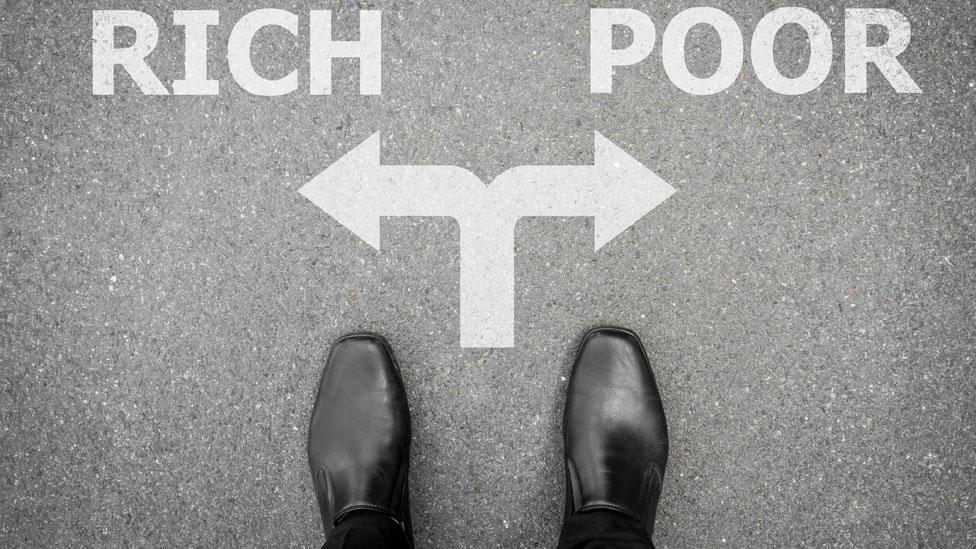How unequal are people in Scotland?
- Published
If you were to imagine Scotland as 100 people, who would they be?
Throughout the week BBC Scotland news is looking at how equal or otherwise Scotland is. And I'm examining a whole range of issues from pensions and savings to health and educational attainment.

Where do you stand? High earning, or low? Rich or poor? Will it be a long life full of opportunity, or will it be short and without hope of getting out of your circumstances?
Or are you, like the vast majority, at neither end. Are you aspiring to move up the ladder? Struggling to hold on to what you've got? Stuck in the middle?
The issue has become a hot one for the economy and for politics.
In Britain, in Scotland, in the United States and in many other countries, inequality has become a dominant theme of political debate.

Throughout this week, the BBC's Reporting Scotland (Monday-Friday 18:30) and Scotland 2016 (Monday-Thursday 22;30-23:00) will be looking at inequality in Scotland.
It is being given a lot of attention by those in power, including heads of government, central bankers, the International Monetary Fund, even the Davos gathering of the economic elite.
Nicola Sturgeon has put the tackling of inequality alongside economic growth as her twin priorities.
Prime Minister Theresa May has targeted her political message at those "struggling to get by".
The UK government has been trying to figure out a way of closing the inequality gap between different parts of the UK, particularly in England.
And inequality has been a big driver of the discontent underlying Donald Trump's appeal to American voters - particularly those who have the spending power of their wages stagnate since the 1970s, while the richest have grabbed a sharply rising share of the nation's wealth.
In Scotland, you can see where you stand if we imagine the nation as 100 people from one end of the spectrum of income to the other.
What's the measure?
The person in the middle, at number 50, has earnings of £444. If your earnings are around £236, then you stand with the 10th lowest earner. If your earnings are around £881, you stand with the 10th highest.
You may stand in a different place, in relation to others, if we look at the spectrum of wealth, of education or of health. But there's a clear link between those.
Some on low income have a good education, or own a big house, but those with low income, little wealth, poor health and low attainment at school are often the same people.
Understanding inequality depends heavily on what you measure.
At the extremes, inequality has stretched. The gap is big and getting larger. But if you look deeper, that's not so clear.
At BBC Scotland, we've been looking in depth at just how unequal Scotland is. We've been asking why that is.

Who is on the path to riches and who is heading for poverty?
How does it compare? How much does it matter? Is it not only inevitable, but a good thing - rewarding those who strive and take risks?
And what - if anything - can be done about it? Higher taxes for re-distribution from the Haves to the Have-Nots? Or spending government funds differently?
For those who can pay more, should they do so - contributing more through charges, for instance, from student fees, to road tolls, to a contribution for doctor visits, to higher care cost contributions in older age?
What is possible?
Or would that undermine the social contract across the inequality spectrum? You might argue that provision for all is essential to maintaining the consensus underlying public services, such as the National Health Service, and therefore the commitment to maintain them.
It might be desirable to have lower inequality with higher economic growth. That is the Scottish government's aim. But is it possible? And under what circumstances?
If inequality really is a priority, and needs to be tackled, it poses tough questions with no easy political answers. What would be a "fair" outcome? And what are those at the fortunate end of the inequality spectrum willing to sacrifice?
It's not just for politicians. Ask yourself: what would you be willing to give up to live in a more equal country? Would you vote for that? And how would you persuade others to do so?